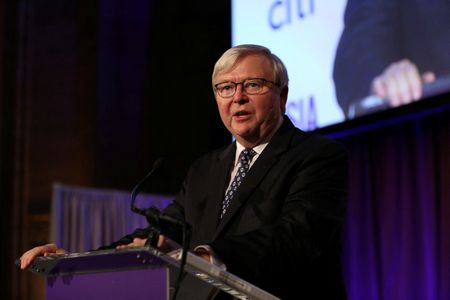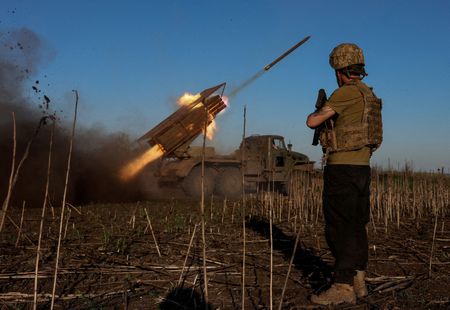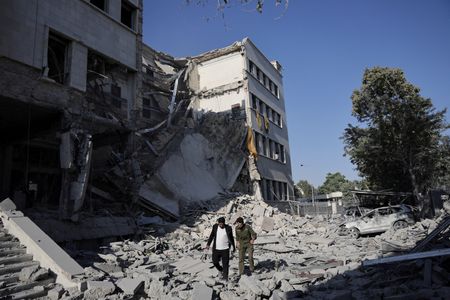By David Brunnstrom
WASHINGTON (Reuters) -Australia’s ambassador to Washington said on Friday his country is working with the Pentagon on the U.S. Defense Department’s review of the AUKUS submarine project and is confident that all issues raised will be resolved.
Kevin Rudd made the comment at the Aspen Security Forum in Colorado and stressed the longstanding U.S.-Australia alliance and his close relationship with Elbridge Colby, the U.S. undersecretary of defense for policy, who initiated the review.
“We’re working with Bridge and the team on the AUKUS review … and we are confident that we’ll work our way through each and every one of the issues which he has raised in the context of this internal Defense Department review,” Rudd said, referring to Colby.
“Bridge has been around my place a lot of times, and so we have known each other for a long period of time, and that’s why I’m confident, quite apart from the mature relationship within our two defense establishments … that we’ll work our way through this stuff.”
Rudd, a former Australian prime minister, said the U.S.-Australia alliance had endured through 15 presidents and 15 prime ministers from different parties.
In 2023, the United States, Australia, and Britain unveiled details of the AUKUS plan to provide Australia with nuclear-powered attack submarines from the early 2030s, part of efforts to counter China’s ambitions in the Indo-Pacific. It is Australia’s biggest ever defense project.
The Pentagon said in June it was reviewing AUKUS to ensure it was “aligned with the President’s America First agenda,” amid concerns about the ability of the U.S. to meet its own submarine needs and whether Australia’s vessels would be used in support of U.S. policy in the future.
On Sunday, Australia’s Defence Industry Minister Pat Conroy responded to a report that Colby had pressed Australia and Japan to clarify what role it would play if the U.S. and China went to war over Taiwan by saying Australia would not commit troops in advance to any conflict.
Australian Prime Minister Anthony Albanese has also rebuffed U.S. requests to commit to lifting defense spending from 2% to 3.5% of gross domestic product, saying instead Australia would spend what was needed for its defense.
The reported call by Colby on Australia to clarify its role regarding Taiwan raised eyebrows, given that Washington itself maintains a policy of “strategic ambiguity” and not saying directly how it would respond to any Chinese attack on the island.
Rudd said U.S. President Donald Trump viewed unpredictability as one of his strengths as a leader, whereas China’s Communist leadership craved predictability.
“Being unpredictable is no bad thing in terms of the way in which the Chinese view their strategic future on the critical question … (of) the future of Taiwan,” he said.
Rudd added that Taiwan currently occupied Beijing’s entire military strategic focus, and if the island were to fall, China’s “capacities and capabilities would be unleashed more broadly.”
“I believe that logic is galvanizing here in the United States as well as across allies,” he said.
Asked about Colby’s reported pressure on Australia and Japan and Australia’s response, a spokesperson for the U.S. State Department said: “The United States has longstanding alliances with both Japan and Australia. We regularly consult with our allies on a range of regional and global issues.”
(Reporting by David Brunnstrom; Editing by Mark Porter, Don Durfee and Rod Nickel)









